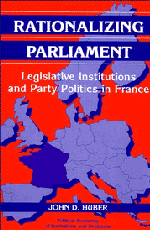Book contents
- Frontmatter
- Contents
- Series editors' preface
- Acknowledgments
- Introduction
- Chapter 1 Parliamentary government in the Fifth Republic
- Chapter 2 Choosing institutions
- Chapter 3 Restrictive procedures and policy conflict
- Chapter 4 Restrictive procedures and bargaining among parties
- Chapter 5 The confidence vote procedure and electoral politics
- Chapter 6 Electoral politics, procedural choice, and the French budget
- CHAPTER 7 Institutional arrangements, political parties, and parliamentary democracy
- Notes
- References
- Index
Chapter 3 - Restrictive procedures and policy conflict
Published online by Cambridge University Press: 05 December 2011
- Frontmatter
- Contents
- Series editors' preface
- Acknowledgments
- Introduction
- Chapter 1 Parliamentary government in the Fifth Republic
- Chapter 2 Choosing institutions
- Chapter 3 Restrictive procedures and policy conflict
- Chapter 4 Restrictive procedures and bargaining among parties
- Chapter 5 The confidence vote procedure and electoral politics
- Chapter 6 Electoral politics, procedural choice, and the French budget
- CHAPTER 7 Institutional arrangements, political parties, and parliamentary democracy
- Notes
- References
- Index
Summary
The primary justification offered for the package vote and the confidence vote procedure by the drafters of the Fifth Republic Constitution was the need to stabilize the government by firmly entrenching executive authority over policymaking processes. As noted in the Introduction, research since 1958 has concluded that these two procedures have been successful to this end. The package vote and the confidence vote procedure are said to have effectively abolished the parliament's right of amendment, thereby ensuring that the government can implement its policy wishes when faced with a recalcitrant parliament. France's two restrictive procedures are thus viewed as institutional arrangements that influence the vertical relationship between the executive and legislature, giving the executive the upper hand when policy conflict with the National Assembly is severe.
There are two problems with the argument that the package vote and the confidence vote procedure are used by the government against the National Assembly for policy purposes. One problem is empirical. There is no reliable empirical evidence demonstrating that restrictive procedures are indeed used by the government in response to policy conflict with parliament. Instead, claims about policy conflict between the government and the National Assembly seem to be based on impressionistic evidence–on observation of the rhetoric in parliament that inevitably surrounds the utilization of the restrictive procedures.
The second problem with the prevailing view is that there exists no logical argument explaining why policy conflict between the government and the National Assembly should lead to the use of restrictive procedures.
- Type
- Chapter
- Information
- Rationalizing ParliamentLegislative Institutions and Party Politics in France, pp. 64 - 81Publisher: Cambridge University PressPrint publication year: 1996



